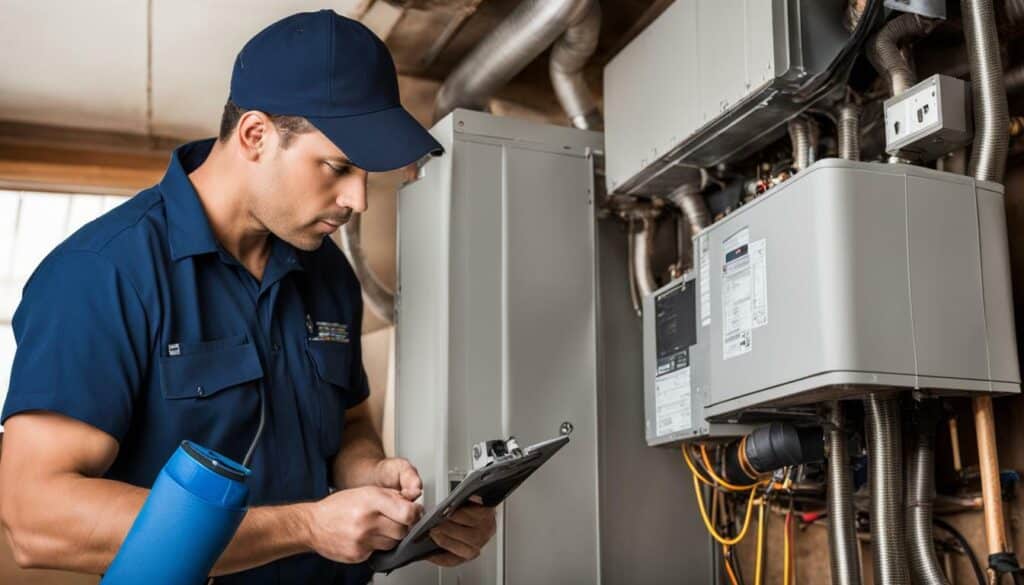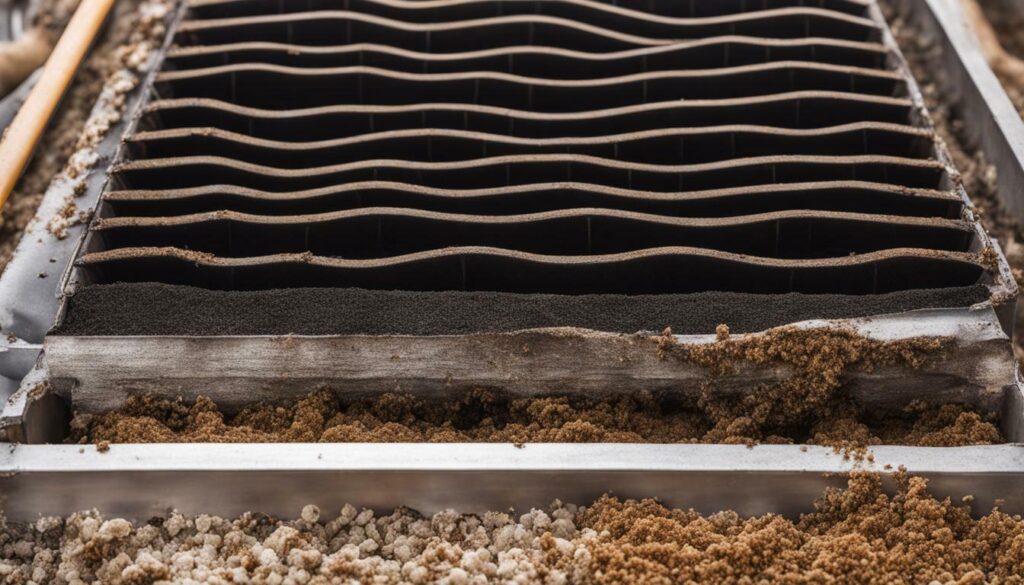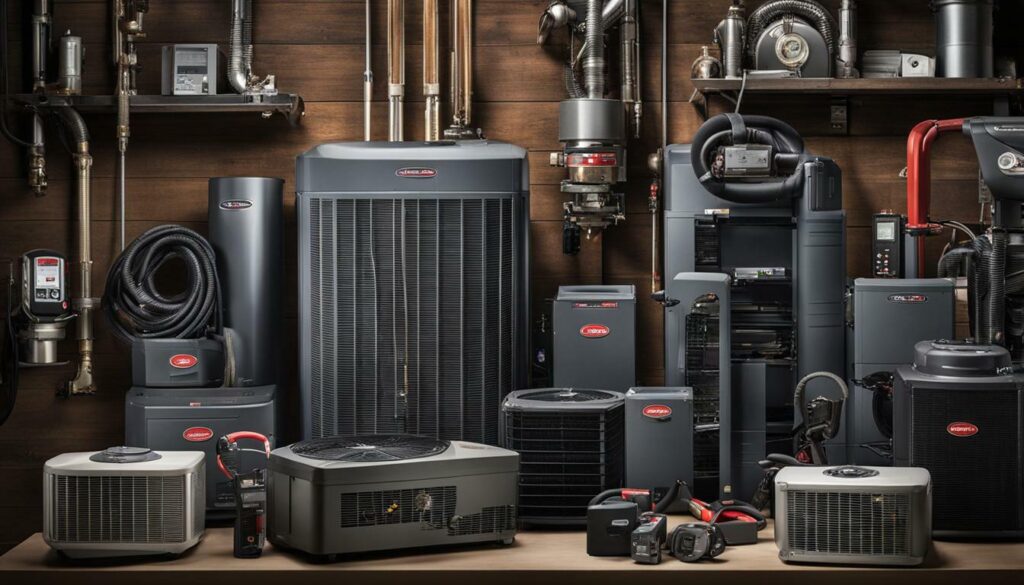
HVAC technician salary is a key consideration for individuals interested in pursuing a career in this field. Understanding the average salary range and factors that affect earnings can help aspiring technicians make informed decisions.
As skilled professionals who work on heating, ventilation, and air conditioning systems, HVAC technicians play a vital role in maintaining indoor comfort. Their expertise is in demand, and as a result, they can earn a competitive salary.
On average, HVAC technicians can expect to earn between $46,000 and $68,000 per year. The actual salary can vary based on factors such as experience, certifications, and geographical location. Technicians with less than one year of experience typically start around $22.47 per hour, while those with over 10 years of experience can earn an average of $32.83 per hour.
The job outlook for HVAC technicians is positive, with a projected 5% growth from 2020 to 2030. This growth is driven by factors such as increased demand for energy-efficient systems, retrofitting projects, and the need for regular maintenance of existing systems.
Salaries can also vary by state. In states such as Alaska, Hawaii, Washington, Massachusetts, and Connecticut, HVAC technicians tend to earn higher average salaries.
In addition to experience and location, certifications can significantly impact an HVAC technician’s earning potential. Technicians with more certifications often command higher salaries due to their specialized expertise.
Experience is another major factor in determining salary. Entry-level technicians with limited experience can expect to earn around $45,760 per year, while senior technicians with over 10 years of experience can earn an average of $57,512 per year. HVAC managers, who oversee teams and projects, can earn an average of $68,286 per year.
Compared to other skilled trades, HVAC technicians generally make a comparable wage to plumbers and electricians and significantly more than construction workers.
There are also opportunities for HVAC technicians to increase their earning potential. Staying up to date with industry developments, improving sales and management skills, and potentially starting their own HVAC company are all avenues to higher salaries.
Furthermore, HVAC technicians have a range of career opportunities to explore. They can become home inspectors, contractors, or work in sales, offering different paths for professional growth and potentially higher salaries.
Key Takeaways:
- The average HVAC technician salary ranges from $46,000 to $68,000 per year.
- Salaries can vary based on experience, certifications, and geographical location.
- Technicians with more certifications tend to have higher earning potential.
- Experience is a significant factor in determining salary, with higher wages for senior technicians and managers.
- There are opportunities to increase earning potential by staying updated with industry developments and improving sales and management skills.
Overall, becoming an HVAC technician can provide a rewarding career with a decent salary and potential for growth. It is essential for aspiring technicians to research and consider the various factors that can impact their earning potential to make informed decisions about their career path.
Several factors contribute to the salary of an HVAC technician, including the specific job they hold, the state they work in, and whether they are in an apprenticeship program or have completed their training. Different HVAC technician jobs have varying salary potential, with some positions offering higher pay than others. For example, HVAC technicians who specialize in the installation and maintenance of complex heating and cooling systems in commercial buildings tend to earn higher salaries compared to those who work primarily in residential settings.
Additionally, the state in which an HVAC technician is employed can greatly impact their salary. States with higher costs of living, such as Alaska, Hawaii, Washington, Massachusetts, and Connecticut, often offer higher average salaries to HVAC technicians to compensate for the increased expenses. On the other hand, states with lower costs of living may have lower average salaries for HVAC technicians.
Furthermore, an HVAC technician’s salary can be influenced by their level of experience and education. While entry-level technicians who are just starting their careers may earn lower salaries, those with several years of experience and additional certifications can command higher wages. Completing an apprenticeship program or obtaining advanced certifications in specialized areas can significantly boost an HVAC technician’s earning potential.
| Experience Level | Average Yearly Salary |
|---|---|
| Entry-level Technicians | $45,760 |
| Senior Technicians | $57,512 |
| Managers | $68,286 |
In summary, the salary of an HVAC technician is influenced by factors such as the specific job role, state of employment, level of experience, and educational qualifications. By choosing higher-paying job opportunities, pursuing additional certifications, and gaining valuable experience, HVAC technicians can maximize their earning potential in this field.
Average HVAC Technician Salary and Hourly Rates
The average salary of an HVAC technician can vary depending on factors such as experience, certifications, and location. Let’s take a closer look at the average salary figures for HVAC technicians and how they can vary.
According to data from the Bureau of Labor Statistics, the average annual salary for HVAC technicians is approximately $55,000. On an hourly basis, this translates to an average wage of $26.44. However, it’s important to note that these figures are just averages and that individual salaries can deviate from this range.
Experience plays a crucial role in determining HVAC technician salaries. Entry-level technicians with less than one year of experience can expect to earn around $45,760 per year, while technicians with more than 10 years of experience earn an average of $57,512 per year. Senior technicians who have gained extensive expertise in the field can earn even higher salaries, with some reaching an average of $68,286 per year.
Certifications can also impact an HVAC technician’s earning potential. Technicians who hold additional certifications, such as the North American Technician Excellence (NATE) certification or the Environmental Protection Agency (EPA) certification, may command higher salaries due to their specialized knowledge and skills.
| Years of Experience | Annual Salary | Hourly Wage |
|---|---|---|
| Less than 1 year | $45,760 | $22.04 |
| 1-4 years | $49,272 | $23.68 |
| 5-9 years | $53,576 | $25.75 |
| 10-19 years | $57,512 | $27.65 |
| 20 years or more | $68,286 | $32.83 |

Location is another significant factor that influences HVAC technician salaries. Salaries can vary widely depending on the state in which the technician is employed. For example, HVAC technicians in states like Alaska, Hawaii, Washington, Massachusetts, and Connecticut tend to earn higher average salaries compared to technicians in other states. This can be attributed to factors such as the cost of living, demand for HVAC services, and local market conditions.
Overall, becoming an HVAC technician can provide a rewarding career with a decent salary and potential for growth. With the right certifications, experience, and dedication to staying current with industry trends, HVAC technicians have opportunities to increase their earning potential and explore diverse career paths within the HVAC field.
HVAC Technician Salary Range
HVAC technician salaries can vary significantly, with a range of earning potential based on various factors. Understanding the salary range for HVAC technicians can help individuals gauge their potential income in this profession.
On average, HVAC technicians earn between $46,000 and $68,000 per year, depending on their level of experience. Entry-level technicians with less than one year of experience typically earn around $22.47 per hour, while those with over 10 years of experience can earn an average of $32.83 per hour. The salary range for HVAC technicians is influenced by factors such as education, certifications, geographic location, and job responsibilities.
Experience plays a crucial role in determining an HVAC technician’s salary. Entry-level technicians with minimal experience can expect to earn around $45,760 per year, while senior technicians with extensive experience may earn an average of $57,512 per year. HVAC managers, who have advanced experience and leadership roles, often earn an average of $68,286 per year. It is worth noting that these figures are average salaries and can vary based on individual circumstances.
Compared to other professions, HVAC technicians generally earn a comparable wage to plumbers and electricians but significantly more than construction workers. The job outlook for HVAC technicians is positive, with a projected 5% growth from 2020 to 2030, which indicates a continued demand for skilled professionals in this field. With additional certifications and continuous education, HVAC technicians can increase their earning potential and explore diverse career paths within the industry.
HVAC Technician Salary by State
The salary of an HVAC technician can vary depending on the state they work in, with some states offering higher average salaries than others for professionals in this field.
| State | Hourly Salary | Annual Salary |
|---|---|---|
| Alabama | $18.77/hr | $39,042 annually |
| Alaska | $39.48/hr | $82,118 annually |
| Arizona | $22.83/hr | $47,486 annually |
| Arkansas | $18.23/hr | $37,918 annually |
| California | $35.36/hr | $73,549 annually |
| Colorado | $29.33/hr | $61,006 annually |
| Connecticut | $36.72/hr | $76,378 annually |
| Delaware | $22.83/hr | $47,486 annually |
| Florida | $19.84/hr | $41,267 annually |
| Georgia | $20.18/hr | $41,974 annually |
| Hawaii | $21.73/hr | $45,198 annually |
| Idaho | $20.42/hr | $42,474 annually |
| Illinois | $25.26/hr | $52,541 annually |
| Indiana | $21.29/hr | $44,283 annually |
| Iowa | $22.86/hr | $47,549 annually |
| Kansas | $19.13/hr | $39,790 annually |
| Kentucky | $21.75/hr | $45,240 annually |
| Louisiana | $27.11/hr | $56,389 annually |
| Maine | $22.30/hr | $46,384 annually |
| Maryland | $32.09/hr | $66,747 annually |
| Massachusetts | $39.27/hr | $81,682 annually |
| Michigan | $23.10/hr | $48,048 annually |
| Minnesota | $24.47/hr | $50,898 annually |
| Mississippi | $20.38/hr | $42,390 annually |
| Missouri | $20.09/hr | $41,787 annually |
| Montana | $24.73/hr | $51,438 annually |
| Nebraska | $22.02/hr | $45,802 annually |
| Nevada | $23.95/hr | $49,816 annually |
| New Hampshire | $25.37/hr | $52,770 annually |
| New Jersey | $33.93/hr | $70,574 annually |
| New Mexico | $22.22/hr | $46,218 annually |
| New York | $23.41/hr | $48,693 annually |
| North Carolina | $20.29/hr | $42,203 annually |
| North Dakota | $28.50/hr | $59,280 annually |
| Ohio | $22.40/hr | $46,592 annually |
| Oklahoma | $20.82/hr | $43,306 annually |
| Oregon | $21.68/hr | $45,094 annually |
| Pennsylvania | $22.22/hr | $46,218 annually |
| Rhode Island | $35.94/hr | $74,755 annually |
| South Carolina | $20.45/hr | $42,536 annually |
| South Dakota | $23.89/hr | $49,691 annually |
| Tennessee | $20.86/hr | $43,389 annually |
| Texas | $21.37/hr | $44,450 annually |
| Utah | $19.03/hr | $39,582 annually |
| Vermont | $21.68/hr | $45,094 annually |
| Virginia | $22.28/hr | $46,342 annually |
| Washington | $27.74/hr | $57,699 annually |
| West Virginia | $19.57/hr | $40,706 annually |
| Wisconsin | $23.08/hr | $48,006 annually |
| Wyoming | $26.22/hr | $54,538 annually |
It’s important to note that these salary figures are based on the median wages for HVAC technicians and can vary depending on factors such as experience, certifications, and the specific job market in each state. Additionally, the cost of living and demand for HVAC services can also impact salaries in different regions.
While these salary differences exist, it’s also worth noting that the demand for HVAC technicians is high across the United States, and job opportunities can be found in various states. As the need for heating, ventilation, and air conditioning systems continues to grow, the earning potential for HVAC technicians remains promising.
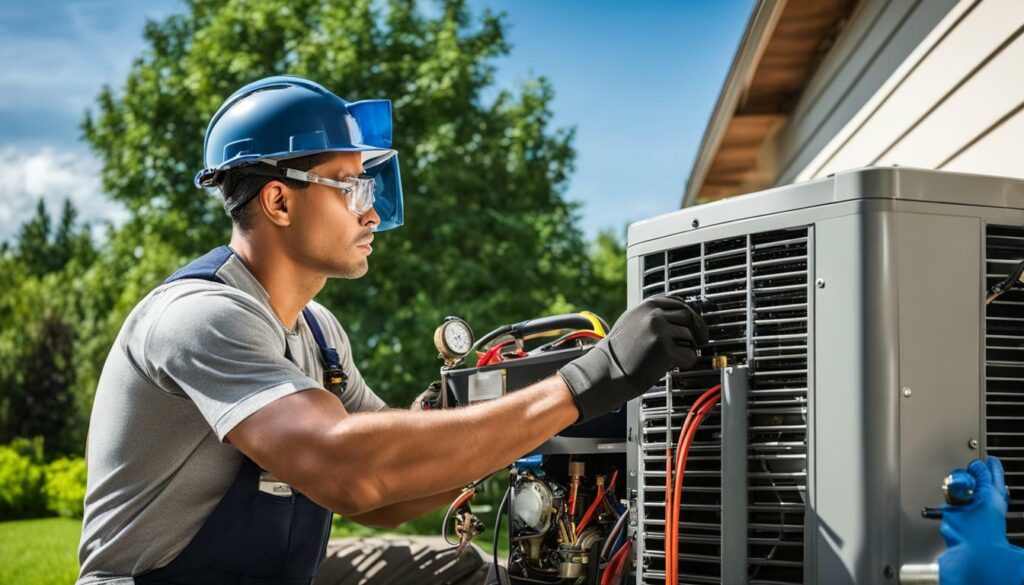
With the right qualifications and experience, HVAC technicians can expect to earn a decent salary regardless of the state they work in. The industry offers opportunities for career growth, increased earnings, and a range of potential career paths within the HVAC field. Whether you’re interested in specializing in certain equipment, working in residential or commercial settings, or even starting your own HVAC business, this profession provides stability, job security, and the potential to earn a comfortable living.
Career Growth and Salary Outlook for HVAC Technicians
The future looks promising for HVAC technicians, with a positive growth outlook and potential opportunities for career advancement and increased earning potential. As the demand for heating, ventilation, and air conditioning systems continues to rise, the need for skilled technicians to install, maintain, and repair these systems will also increase. According to the Bureau of Labor Statistics, the job outlook for HVAC technicians is projected to grow by 5% from 2020 to 2030, which is considered faster than the average for all occupations.
With the increasing focus on energy efficiency and environmental sustainability, HVAC technicians who have expertise in energy-efficient systems and technologies will be in high demand. This includes knowledge of renewable energy sources, such as solar and geothermal systems, as well as proficiency in smart HVAC controls and automation. By staying up to date with the latest industry developments and acquiring relevant certifications, HVAC technicians can position themselves for greater career opportunities and higher salaries.
Experience also plays a significant role in determining an HVAC technician’s earning potential. Entry-level technicians typically start with an average salary of around $45,760 per year, while senior technicians with over 10 years of experience can earn an average of $57,512 per year. Those who advance into management positions have the potential to earn an average salary of $68,286 per year. By continuously gaining experience and honing their skills, HVAC technicians can progress in their careers and command higher salaries.
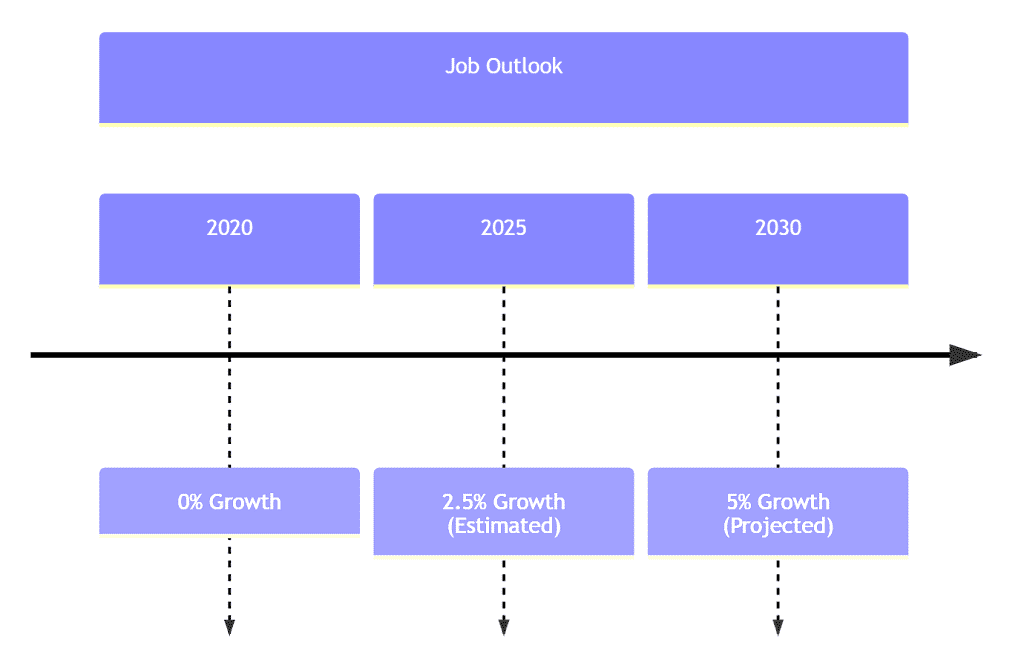
When compared to other skilled trades, HVAC technicians generally earn a comparable wage. They tend to make more than construction workers but are on par with plumbers and electricians. The ability to increase earning potential further lies in developing sales and management skills. HVAC technicians who excel in these areas can leverage their expertise to secure higher-paying positions or potentially start their own HVAC businesses.
Furthermore, HVAC technicians have diverse career paths to explore. Apart from working as technicians, they can branch out into roles such as home inspectors, contractors, or specialize in sales within the HVAC industry. These alternative career paths often come with unique salary structures and potential for growth.
Summary
- The future looks promising for HVAC technicians, with a positive growth outlook and potential opportunities for career advancement and increased earning potential.
- As the demand for HVAC systems rises, skilled technicians will be in high demand to install, maintain, and repair these systems.
- Knowledge of energy-efficient systems, renewable energy sources, and smart HVAC controls can enhance an HVAC technician’s marketability and earning potential.
- Experience and continuous skill development are key factors in determining an HVAC technician’s salary, with senior technicians and managers commanding higher salaries.
- Compared to other skilled trades, HVAC technicians generally earn a comparable wage, with opportunities for increased earning potential through sales and management roles.
- HVAC technicians have diverse career paths to explore, such as home inspectors, contractors, or sales professionals, offering varied salary structures and potential for growth.
| Years of Experience | Average Annual Salary |
|---|---|
| Entry-level (less than 1 year) | $45,760 |
| Senior Technician (over 10 years) | $57,512 |
| Manager | $68,286 |
Advancing Your HVAC Technician Salary: Certifications and Experience
HVAC technicians can enhance their earning potential through factors such as gaining additional certifications and accumulating years of experience in the field. Let’s delve into how these factors can help technicians advance their salary.
One of the most significant ways to increase earning potential is by obtaining industry certifications. HVAC technicians who possess specialized certifications, such as those offered by organizations like the North American Technician Excellence (NATE) or the Air Conditioning Contractors of America (ACCA), often receive higher salaries and more job opportunities. These certifications validate a technician’s expertise in specific areas of HVAC systems, such as installation, maintenance, or repair, making them highly sought after by employers.
| Certification | Average Salary Increase |
|---|---|
| NATE Certification | $3,000 – $5,000 per year |
| ACCA Certification | $2,000 – $4,000 per year |
In addition to certifications, experience plays a crucial role in an HVAC technician’s salary growth. As technicians gain more on-the-job experience, they become more proficient in diagnosing and solving complex HVAC issues, which translates into higher salaries. According to industry data, experienced HVAC technicians earn an average of $57,512 per year, compared to entry-level technicians who earn around $45,760 per year. Furthermore, technicians who take on supervisory roles or become managers can expect to earn even higher salaries, with an average of $68,286 per year.
It’s important to note that experience and certifications often go hand in hand. As technicians gain experience, they become eligible for advanced certifications, further boosting their earning potential. Employers value technicians with a combination of experience and certifications, as they demonstrate a commitment to professional growth and a strong foundation of knowledge in the field.
By investing in additional certifications and accumulating years of experience, HVAC technicians can significantly increase their earning potential. Whether it’s becoming certified in specific HVAC systems or pursuing advanced certifications in areas like energy efficiency or green technology, technicians who proactively seek out opportunities for professional development are more likely to reap the financial rewards in the long run.

Comparing HVAC technician salaries to those of other professions can shed light on the earning potential and overall value of pursuing a career in the HVAC industry. While HVAC technicians may not make as much as some high-paying professions like doctors or lawyers, they still enjoy a respectable salary that reflects their specialized skills and expertise.
According to the Bureau of Labor Statistics, the average annual salary for HVAC technicians is around $54,000, which is higher than the average salary for all occupations combined. In comparison, plumbers and electricians, who also work in the skilled trades, have similar earning potential, with average salaries ranging from $50,000 to $60,000 per year.
| Profession | Average Annual Salary |
|---|---|
| HVAC Technician | $54,000 |
| Plumber | $55,000 |
| Electrician | $56,000 |
| Construction Worker | $38,000 |
When compared to construction workers, who perform physically demanding labor, HVAC technicians earn significantly higher salaries. The average annual salary for construction workers is around $38,000, making HVAC technicians a more financially rewarding career choice.

While it’s important to consider the salary potential when choosing a career, it’s equally vital to assess the job’s other benefits and growth opportunities. HVAC technicians not only enjoy a decent salary but also have the potential for career advancement, such as becoming home inspectors or starting their own HVAC company. Overall, the HVAC industry offers stability, competitive salaries, and a range of career paths to pursue.
Opportunities for Increased Earning Potential in the HVAC Field
HVAC technicians have various avenues to explore in order to increase their earning potential, and this section will highlight some of the key opportunities available in the field. One of the most effective ways to enhance earning potential is by obtaining additional certifications. Advanced certifications, such as those in specialized areas like commercial refrigeration or energy efficiency, can open doors to higher-paying job opportunities. These certifications demonstrate a technician’s expertise and dedication to professional development, making them more valuable to potential employers.
Another way to increase earning potential is by gaining experience in sales and customer service. As an HVAC technician, having strong communication and sales skills can lead to more lucrative job opportunities, as technicians who can upsell products or services are often rewarded with higher commissions or bonuses. Additionally, technicians who excel in customer service can build a strong reputation within the industry, which can lead to lucrative referrals or repeat business.
Furthermore, technicians who aspire to advance their careers and increase their earning potential can consider pursuing management positions. Moving into a managerial role allows technicians to oversee projects, teams, and budgets, which often comes with a higher salary and additional benefits. Becoming a manager requires not only technical expertise but also leadership and organizational skills, so technicians should focus on developing these competencies alongside their technical abilities.
| Certification | Estimated Salary Increase |
|---|---|
| Commercial Refrigeration | $5,000 – $8,000 per year |
| Energy Efficiency | $4,000 – $6,000 per year |
| Building Automation Systems | $6,000 – $9,000 per year |
“Obtaining additional certifications can significantly boost an HVAC technician’s earning potential. Not only do they showcase your expertise and commitment to professional development, but they also open up doors to higher-paying job opportunities.” – HVAC Industry Expert
Ultimately, HVAC technicians who strive for continuous growth and improvement can significantly increase their earning potential within the field. By acquiring specialized certifications, developing strong sales and customer service skills, and pursuing management positions, technicians can propel their careers forward and enjoy the financial rewards that come with it.

HVAC technicians have the opportunity to pursue diverse career paths within the industry, each offering its own unique salary potential and professional satisfaction. While many technicians choose to specialize in installation, maintenance, and repair of heating, ventilation, and air conditioning systems, others may explore alternative roles that leverage their technical skills and expertise.
One possible career path for HVAC technicians is to become a home inspector. Home inspectors play a crucial role in assessing the condition of residential properties, including HVAC systems. By conducting thorough inspections and providing detailed reports, HVAC technicians turned home inspectors can help homebuyers make informed decisions and ensure the overall safety and efficiency of HVAC systems.
Another option for HVAC technicians is to venture into contracting. By starting their own HVAC contracting business, technicians can enjoy greater control over their work schedule, projects, and earnings potential. Becoming a contractor allows technicians to expand their services beyond installation and repair, potentially offering HVAC system design, energy efficiency assessments, and consultation services to clients.
Table: Average Salaries for Diverse HVAC Career Paths
| Career Path | Average Salary |
|---|---|
| Home Inspector | $54,660 per year |
| HVAC Contractor | $68,320 per year |
| Sales Professional | $54,360 per year (plus commission) |
Additionally, some HVAC technicians may find opportunities in sales. With their technical knowledge and understanding of HVAC systems, technicians can excel in sales roles, promoting and selling HVAC products and services to residential and commercial clients. Sales professionals in the HVAC industry can earn a base salary, commission, or a combination of both, depending on their performance and the company they work for.
Regardless of the career path chosen, HVAC technicians can enjoy the potential for growth and higher earnings by continuously updating their skills, pursuing relevant certifications, and staying abreast of industry advancements. By exploring the diverse possibilities within the HVAC field, technicians can shape their careers to align with their interests, goals, and income expectations.

HVAC technician salaries can vary based on experience, location, and other factors, but on average, professionals in this field can expect to earn a competitive salary. The average HVAC technician salary ranges from $46,000 to $68,000 per year, depending on experience. Entry-level technicians can earn around $45,760 per year, while senior technicians earn $57,512 per year, and managers earn $68,286 per year on average. Technicians with less than one year of experience typically earn around $22.47 per hour, while those with over 10 years of experience earn an average of $32.83 per hour.
Experience plays a significant role in determining salary, and certifications can also contribute to higher earning potential. HVAC technicians with more certifications tend to have higher salaries. The job outlook for HVAC technicians is positive, with a projected 5% growth from 2020 to 2030. Salaries can vary by state, with higher average salaries in states such as Alaska, Hawaii, Washington, Massachusetts, and Connecticut.
Compared to other professions, HVAC technicians generally earn a comparable wage to plumbers and electricians, and significantly more than construction workers. This makes the HVAC field an attractive career choice for individuals interested in working with heating, ventilation, and air conditioning systems. Furthermore, there are opportunities to increase earning potential by staying up to date with industry developments, improving sales and management skills, and even starting their own HVAC company.
In terms of career paths, HVAC technicians have a range of opportunities available to them. They can become home inspectors, contractors, or work in sales roles related to the industry. This diversity allows HVAC technicians to explore different avenues and potentially increase their salary as they progress in their career. Overall, becoming an HVAC technician can provide a rewarding career with a decent salary and potential for growth.
FAQ
What is the average salary range for HVAC technicians?
The average HVAC technician salary ranges from $46,000 to $68,000 per year, depending on experience.
How much do entry-level HVAC technicians earn?
Entry-level HVAC technicians earn around $22.47 per hour or approximately $45,760 per year.
What is the average hourly rate for experienced HVAC technicians?
HVAC technicians with over 10 years of experience earn an average of $32.83 per hour.
How does experience affect HVAC technician salaries?
Experience is a significant factor in determining salary. Senior technicians with more experience earn an average of $57,512 per year, while managers earn $68,286 per year on average.
Which states have the highest HVAC technician salaries?
States like Alaska, Hawaii, Washington, Massachusetts, and Connecticut offer higher average salaries for HVAC technicians.
What are the job prospects for HVAC technicians?
The job outlook for HVAC technicians is positive, with a projected 5% growth from 2020 to 2030.
Do HVAC technicians have opportunities for career growth?
Yes, HVAC technicians can increase their earning potential by staying up to date with industry developments, improving sales and management skills, and potentially starting their own HVAC company.
How do the salaries of HVAC technicians compare to other professions?
HVAC technicians generally make a comparable wage to plumbers and electricians and significantly more than construction workers.
What are some possible career paths for HVAC technicians?
HVAC technicians can pursue career paths such as becoming home inspectors, contractors, or working in sales.

